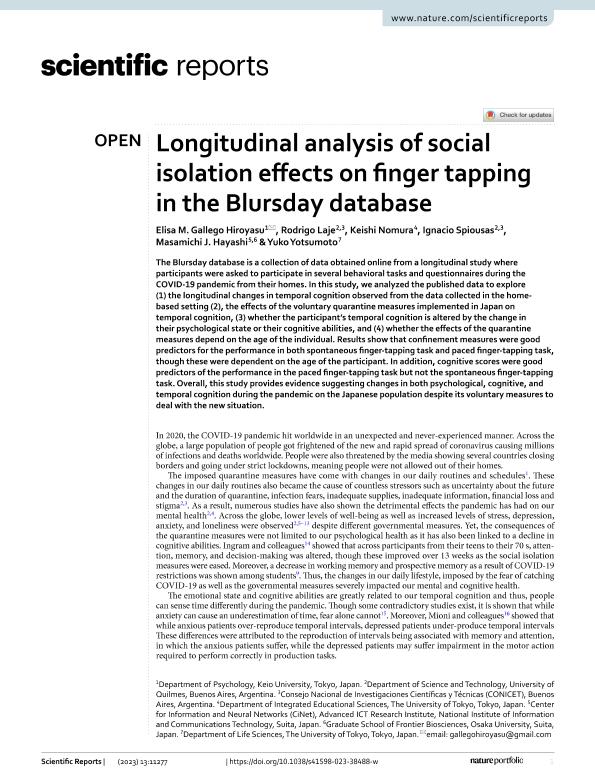Artículo
Longitudinal analysis of social isolation effects on finger tapping in the Blursday database
Gallego Hiroyasu, Elisa M.; Laje, Rodrigo ; Nomura, Keishi; Spiousas, Ignacio
; Nomura, Keishi; Spiousas, Ignacio ; Hayashi, Masamichi J.; Yotsumoto, Yuko
; Hayashi, Masamichi J.; Yotsumoto, Yuko
 ; Nomura, Keishi; Spiousas, Ignacio
; Nomura, Keishi; Spiousas, Ignacio ; Hayashi, Masamichi J.; Yotsumoto, Yuko
; Hayashi, Masamichi J.; Yotsumoto, Yuko
Fecha de publicación:
07/2023
Editorial:
Springer
Revista:
Scientific Reports
ISSN:
2045-2322
Idioma:
Inglés
Tipo de recurso:
Artículo publicado
Clasificación temática:
Resumen
The Blursday database is a collection of data obtained online from a longitudinal study where participants were asked to participate in several behavioral tasks and questionnaires during the COVID-19 pandemic from their homes. In this study, we analyzed the published data to explore (1) the longitudinal changes in temporal cognition observed from the data collected in the home-based setting (2), the effects of the voluntary quarantine measures implemented in Japan on temporal cognition, (3) whether the participant’s temporal cognition is altered by the change in their psychological state or their cognitive abilities, and (4) whether the effects of the quarantine measures depend on the age of the individual. Results show that confinement measures were good predictors for the performance in both spontaneous finger-tapping task and paced finger-tapping task, though these were dependent on the age of the participant. In addition, cognitive scores were good predictors of the performance in the paced finger-tapping task but not the spontaneous finger-tapping task. Overall, this study provides evidence suggesting changes in both psychological, cognitive, and temporal cognition during the pandemic on the Japanese population despite its voluntary measures to deal with the new situation.
Palabras clave:
COGNITIVE SCIENCE
,
TIME PROCESSING
,
FINGER TAPPING
,
SOCIAL ISOLATION
Archivos asociados
Licencia
Identificadores
Colecciones
Articulos(SEDE CENTRAL)
Articulos de SEDE CENTRAL
Articulos de SEDE CENTRAL
Citación
Gallego Hiroyasu, Elisa M.; Laje, Rodrigo; Nomura, Keishi; Spiousas, Ignacio; Hayashi, Masamichi J.; et al.; Longitudinal analysis of social isolation effects on finger tapping in the Blursday database; Springer; Scientific Reports; 13; 1; 7-2023; 1-16
Compartir
Altmétricas



